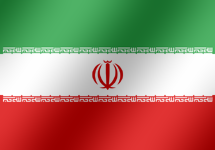February 3, 2017
The White House on Friday announced new sanctions on Iran following its recent ballistic-missile test. The US Treasury Department announced the measures against thirteen individuals and twelve entities it said were connected to Iran’s ballistic-missile program or provided support to Iran’s Islamic Revolutionary Guard Corps’ Qods Force. Five of the entities are based in Iran, four are based in Lebanon, one is based in the United Arab Emirates, and two are based in China. The sanctions also designate Abdollah Asgharzadeh, an Iranian businessman whom the Treasury Department accused of acting as a procurement agent for the ballistic-missile program, as well as individuals in his network. The new sanctions are designed not to violate the Joint Comprehensive Plan of Action (JCPOA), the nuclear agreement struck between Iran and five world powers in July 2015.

Flag of Iran (Src: Wikimedia Commons)
The new sanctions come in response to a test on Sunday of what is thought to be a Khorramshahr medium-range ballistic missile. The Khorramshahr is likely a variant of the North Korean Musudan missile. Iran previously tested a Musudan-type missile in July under a different name. The missile test does not violate the JCPOA, which is limited to nuclear activities. While the nuclear agreement itself does not address Iran’s ballistic-missile activities, UN Security Council Resolution 2231, negotiated at the same time as the nuclear deal, “calls upon” Iran not to “undertake any activity related to ballistic missiles.” The resolution’s phrasing is seen as easing missile restrictions on Iran because in the past such tests had been prohibited all together.
Similarly, missile-related sanctions imposed by the US on Iran are not in violation of the nuclear agreement. The new sanctions enacted by the Trump administration were similar to actions taken by the Obama administration targeting Iran’s ballistic-missile network which remained in force after the signing of the JCPOA. Though the missile sanctions are external to the JCPOA, it is not clear how Iran may respond.
CNS Experts Available for Comment
For more on the implications of this latest development, the following CNS experts are available for comment:
- Chen Kane, Director of the Middle East Nonproliferation Program • [email protected] • 202-842-3100 x 303
- Jeffrey Lewis, Director of the East Asia Nonproliferation Program • [email protected] • 831-647-6616
- Robert Shaw, Program Director, Export Control and Nonproliferation Program • [email protected] • 831-647-6576
- Nikolai Sokov, Senior Fellow • [email protected] • 831-647-6577
- Leonard Spector, Executive Director, Washington, DC • [email protected] • 202-842-3100 x 302
Recent Relevant Analysis
- “Outlawing State Sponsored Nuclear Procurement Programs and Pursuing Recovery of Misappropriated Goods,” by Leonard Spector, December 2016.
- “Deal or No Deal: What Should Be the Fate of the Joint Comprehensive Plan of Action?” analysis by Farnaz Alimehri, December 19, 2016.
- “The Iranian Nuclear Deal – Myths and Misinformation,” seminar with Joe Brazda, December 19, 2016
- “On Fabius and the Fabulous Iran Deal,” analysis by Jeffrey Lewis, October 17, 2017.
For more information or inquiries, contact Miles Pomper and/or Gabrielle Tarini.
